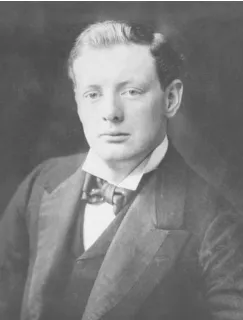
Sir Winston S.Churchill
I had scarcely passed my twelfth birthday when I enter the inhospitable regions of examination, through which for next seven years I was destined to journey. These examination were a great tril to me. The subject which were dearest to the examiners were almost invariably those I fancied least. I would Have Liked to have been examined in history, poetry and writing essays. The examiners, on the other hand , were partial to Latin and Mathematics.
And their will prevailed Moreover, the question which they asked on both these subjects were almost invariably those to which I was unable to suggest a satisfactory answer. I should have liked to be asked to say what. I knew. They always tried to ask what I did not know. When I would have willingly displayed my knowledge, they sought to expose my ignorance. This sort of treatment had only one result; I did not do well in examinations.
This was especially ture of my Entrance Examinatin to Harrow . The Headmaster, Mr. Welldon, however, took a broad-minded view of my Latin prose: he showed discernment in judging my general ability. This was the more remarkable, beasuse I was found unable to answer a single question in the Latin paper. I wrote my name at the top of the page. I wrote down the number of the question `I`.

After much reflection I put a bracket round it thus `(I)`. But thereafter I could not think of anything connected with it that was either relevant or true. Incidentally there arrived from nowhere in particular a bolt and several smudges. I gazed for two whole hours at this sad spectacle: and then merciful ushers collected my piece of foolscap with all the others andcarried it up to the headmaster`s table. It was from these slender indications of scholarship that Mr. Welldon drew the conclusion that I was worthy to pass into Harrow. It is very much to this credit. It showed that he was a man capable of looking beneath the surface of things: a man not dependent upon paper manifestations. I have always had the greatest regard for him.
In consequence of this decision , I was in due course placed in the third, or lowest, division of the Fourth, or bottom. The names of the new boys were printed in the School List in alphabetical order and as my correct name, Spencer-Churchill, began with an `S`. I gained no more advantage from the alphabet than from the wider sphere of letters. I was in fact only two from the bottom o the whole school; and these two, I regret to say, disappeard almost immediately through illness or some other cause .
I contined in this unpretentious situation for nearly a year. However, by being so long in the lowest from I gained an immense advantage over the cleverer boys. They all went on to learn Latin and Greek amd splendid things like that. But I was taught English. We were considered such dunces that we could learn only English. Mr. Somervell—a most delightful man, o whom my debt is great-was charged with the duty of teaching the stupidest boys the most disregarded things-namely , to write mere English. He knew how to do it.
He taught it as no one else has ever taught it. Not only did we learn English parsing thoroughly, but we also parctised continually English analysis. Mr. Somervell has system of his own. He took a fairly long sentence and broke it up into its components by means of black, red, blue and green inks: Subject, Verb, Relative Clauses, Conditional Clause, Conjunctive and Disjunctive Clauses! Each had its colour and its bracket. It was a kind of dril. We did it almost daily.
As remined in the Third three times as long as anyone else, I had three times as much of it. I learned it thoroughly. Thus I got into my bones the essential structure of the ordinary British sentence-which is a noble thing. And when in after years my school-fellows who had won prizes and distinction for writing such beautiful Latin poetry and pithy Greek epigrams had to come down again to common English, to earn their living or make their way, I did not feel myself at any disadvantage. Naturally I am biased in favour of boys learning English. I would make them all learn English: and then I would let the clever ones learn Latin as an honour, and Greek as a treat, but the only thing I would whip them for is not knowing English. I would ehip them hard for that.